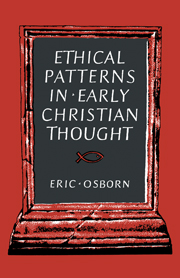INTRODUCTION
Published online by Cambridge University Press: 12 November 2009
Summary
An examination of early Christian ethics may begin with a brief appreciation of those contemporary factors which make this enterprise appropriate now. The study of ethics has, in the last thirty years, moved towards a wider recognition of the complexity and diversity of ethical problems. If moral philosophy is a practical science concerned with questions of the form ‘What shall I do?’ then, one writer insists, ‘no general answer can be given to this type of question. The most a moral philosopher can do is to paint a picture of various types of life in the manner of Plato and ask which type of life you really want to lead.’ Another sees the function of moral philosophy as ‘that of helping us to think better about moral questions by exposing the logical structure of the language in which this thought is expressed’. For him moral judgements are prescriptive, can be universalised, are descriptive and may be logically interrelated. Reason, good reason for acting in one way rather than in another, provides another way of looking at ethical inquiry or moral judgements. The crucial thing is that we should have moral points of reference which we have deliberately adopted. ‘To become morally adult is… to learn to use “ought” -sentences in the realisation that they can only be verified by reference to a standard or set of principles which we have by our own decision accepted and made our own.’
- Type
- Chapter
- Information
- Ethical Patterns in Early Christian Thought , pp. 1 - 14Publisher: Cambridge University PressPrint publication year: 1976



